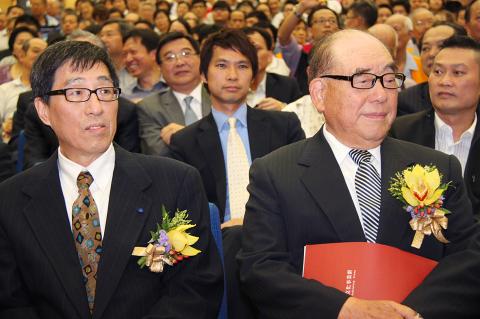Beijing must work with Taiwan toward “reunification” through a new mechanism of “Chinese-style” democracy that would limit the political arena to only a few political parties, former premier Hau Pei-tsun (郝柏村) has said.
Hau, who delivered a keynote speech at the City University of Hong Kong on Friday, said that only when China abandons the threat of force against Taiwan and the two sides embrace “Chinese-style” democracy will the “Chinese dream” be accomplished, the South China Morning Post reported on Sunday.
In recent years, Beijing has increasingly relied on forums in Hong Kong and China to further its “united front” work by inviting senior Chinese Nationalist Party (KMT) members, retired Taiwanese generals and even a select number of Democratic Progressive Party (DPP) members, such as former premier Frank Hsieh (謝長廷), to attend.

Photo: CNA
“The premise for democracy should be to stop the fighting between Chinese people [sic] and to end the era of political power that grows out of the barrel of a gun, which are key elements to realizing the ‘China dream,’” the Post quoted Hau as saying.
The 94-year-old said that examples of peaceful liberalization and democratization in Taiwan following the death of president Chiang Kai-shek (蔣介石) in 1975 and during the Chiang Ching-kuo (蔣經國) and Lee Teng-hui (李登輝) presidencies could serve as a model for China.
“The future development of cross-strait relations should stick to ‘no war, no [Taiwan] independence and gradual unification,’” Hau said.
Hau said that “Chinese-style” democracy would be an alternative to democracy as it is practiced in the West — and in Taiwan — where theoretically, if not in practice, there is no ceiling on the number of political parties.
“Taiwan started democratic reform to end one-party rule and lifted a press ban when the domestic economy was taking off in the 1980s,” Hau said, repeating the disputed belief that as they become wealthier, Chinese are likely to desire a relaxing of the political system.
Under “Chinese-style” democracy, the number of political parties would be limited to just a few.
“Only major parties with at least 20 percent of public popularity would qualify to nominate candidates,” Hau said, a proposal that, with Taiwan and China treated as a single polity, would almost certainly bring about the demise of both the DPP and the KMT, not to mention Taiwan’s smaller parties.
There is no evidence at this point that the Chinese Communist Party, which under Chinese President Xi Jinping (習近平) has hardened its grip on Chinese society, would brook the presence of political competitors, especially parties with the ability to garner 20 percent of public support.
Hau caused a stir late last month when, addressing the “Witness Taiwan Democracy” forum organized by the Taiwan Foundation for Democracy, he denied that Taiwan was a sovereign nation and added that no democratic country — presumably a unified China — can accommodate two different democratic systems.
“When people on both sides of the Strait reach a consensus on their political system, unification will come to fruition naturally,” he said at the time.

Chinese Nationalist Party (KMT) Chairman Eric Chu (朱立倫), spokeswoman Yang Chih-yu (楊智伃) and Legislator Hsieh Lung-chieh (謝龍介) would be summoned by police for questioning for leading an illegal assembly on Thursday evening last week, Minister of the Interior Liu Shyh-fang (劉世芳) said today. The three KMT officials led an assembly outside the Taipei City Prosecutors’ Office, a restricted area where public assembly is not allowed, protesting the questioning of several KMT staff and searches of KMT headquarters and offices in a recall petition forgery case. Chu, Yang and Hsieh are all suspected of contravening the Assembly and Parade Act (集會遊行法) by holding

PRAISE: Japanese visitor Takashi Kubota said the Taiwanese temple architecture images showcased in the AI Art Gallery were the most impressive displays he saw Taiwan does not have an official pavilion at the World Expo in Osaka, Japan, because of its diplomatic predicament, but the government-backed Tech World pavilion is drawing interest with its unique recreations of works by Taiwanese artists. The pavilion features an artificial intelligence (AI)-based art gallery showcasing works of famous Taiwanese artists from the Japanese colonial period using innovative technologies. Among its main simulated displays are Eastern gouache paintings by Chen Chin (陳進), Lin Yu-shan (林玉山) and Kuo Hsueh-hu (郭雪湖), who were the three young Taiwanese painters selected for the East Asian Painting exhibition in 1927. Gouache is a water-based

Taiwan would welcome the return of Honduras as a diplomatic ally if its next president decides to make such a move, Minister of Foreign Affairs Lin Chia-lung (林佳龍) said yesterday. “Of course, we would welcome Honduras if they want to restore diplomatic ties with Taiwan after their elections,” Lin said at a meeting of the legislature’s Foreign Affairs and National Defense Committee, when asked to comment on statements made by two of the three Honduran presidential candidates during the presidential campaign in the Central American country. Taiwan is paying close attention to the region as a whole in the wake of a

OFF-TARGET: More than 30,000 participants were expected to take part in the Games next month, but only 6,550 foreign and 19,400 Taiwanese athletes have registered Taipei city councilors yesterday blasted the organizers of next month’s World Masters Games over sudden timetable and venue changes, which they said have caused thousands of participants to back out of the international sporting event, among other organizational issues. They also cited visa delays and political interference by China as reasons many foreign athletes are requesting refunds for the event, to be held from May 17 to 30. Jointly organized by the Taipei and New Taipei City governments, the games have been rocked by numerous controversies since preparations began in 2020. Taipei City Councilor Lin Yen-feng (林延鳳) said yesterday that new measures by